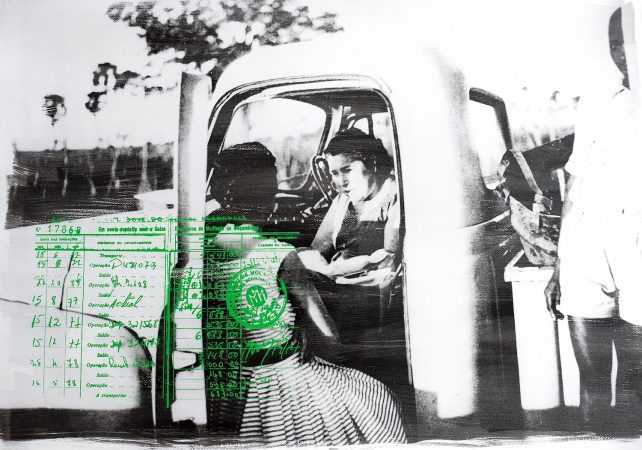Tiwani Contemporary, London, United Kingdom
11 Nov 2016 - 13 Dec 2016

Délio Jasse, 'The Lost Chapter: Nampula 1963' (2016), photographic emulsion and screenprint on Fabriano paper
Tiwani Contemporary now represents Délio Jasse and is delighted to announce his first solo exhibition at the gallery. Jasse is known for his experimental photographic work, in which he often interweaves found images with clues from past lives to draw links between photography and memory. The Lost Chapter: Nampula, 1963, a new, previously unseen body of work, continues the artist’s exploration of the photographic archive.
Upon visiting a flea market in Lisbon, Jasse acquired boxes of unwanted documents that contained several hundred photographs, many of which captured the life of a Portuguese family living in Nampula, Mozambique in the 1960s. While the identity of the family remains unknown, Jasse was able, through months of archive work, to piece together fragments of the family’s narrative by cross-referencing the prints against the official paperwork (bank stamps, government letter, personal correspondence) and clues relating to the photographic process (such as stamps from photographic studios) to shed light on aspects of the family’s identity and their whereabouts.
The resulting body of work bears witness to Jasse’s research process and explores the direct implications of his appropriation of the archive. Working with light-sensitive emulsions, Jasse has transformed the original material into his own pictorial works. Each stroke reveals the artist’s fascination with analogue printing techniques and the relationship between painting and photography, as much as it evokes the slow fading of a memory. The prints are marked with vivid screen-printed stamps, which were lifted from the official documentation attributed to the family. With this gesture, Jasse highlights his own hand in the process of interpreting the archive, and evokes the role of photography as a tool of administrative control.
In the 1950s and ’60s, the thriving colonial economy attracted thousands of new Portuguese immigrants to Mozambique. Several photographs in the exhibition show mundane recreational scenes of everyday life: an afternoon at the beach, a birthday party, Sunday gatherings in quaint compound cottages with neat front lawns. The family’s leisurely lifestyle highlights the distinct economic privilege they enjoyed and the inherent inequality of the colonial system. Meanwhile, the absence of black Mozambicans, aside from the few instances in which staff or passers-by furtively appear in the frame, suggests that much of the local population was experiencing a different reality. As Jasse reconstructs the family’s archive, wider historical and political narratives overshadow the personal.
The Lost Chapter: Nampula, 1963 raises questions around the role of the researcher (in this case, the artist) in the archival process. A series of large double exposures directly addresses Jasse’s fictionalisation and further explores his role as an interpreter of history. In these works, Jasse has created a new, fictive identity for the family members. A hybrid merging of their faces with architectural elements from their compound alludes to the transformative potential of the archive and the transient and imperfect nature of memory.
.
.
Délio Jasse (b. 1981) moved to Portugal at 18 and currently lives in Milan. Jasse is known for experimenting with analogue photographic printing processes, including cyanotype, platinum and early printing processes such as Van Dyke Brown, as well as developing his own printing techniques. Recent exhibitions include the official selection of the 12th Dakar Biennale (2016), the 56th Venice Biennale (Angolan Pavilion, 2015), Milan Expo (Angolan Pavilion, 2015), the Calouste Gulbenkian Foundation, Portugal (2013) and the 9th Bamako Photography Encounters (2013). Jasse was one of three finalists in the BES Photo Prize in 2014 (now Novo Banco Prize, in partnership with Museu Berardo, Lisbon).